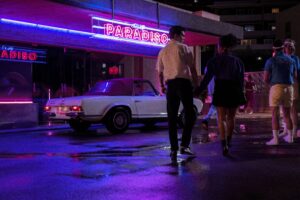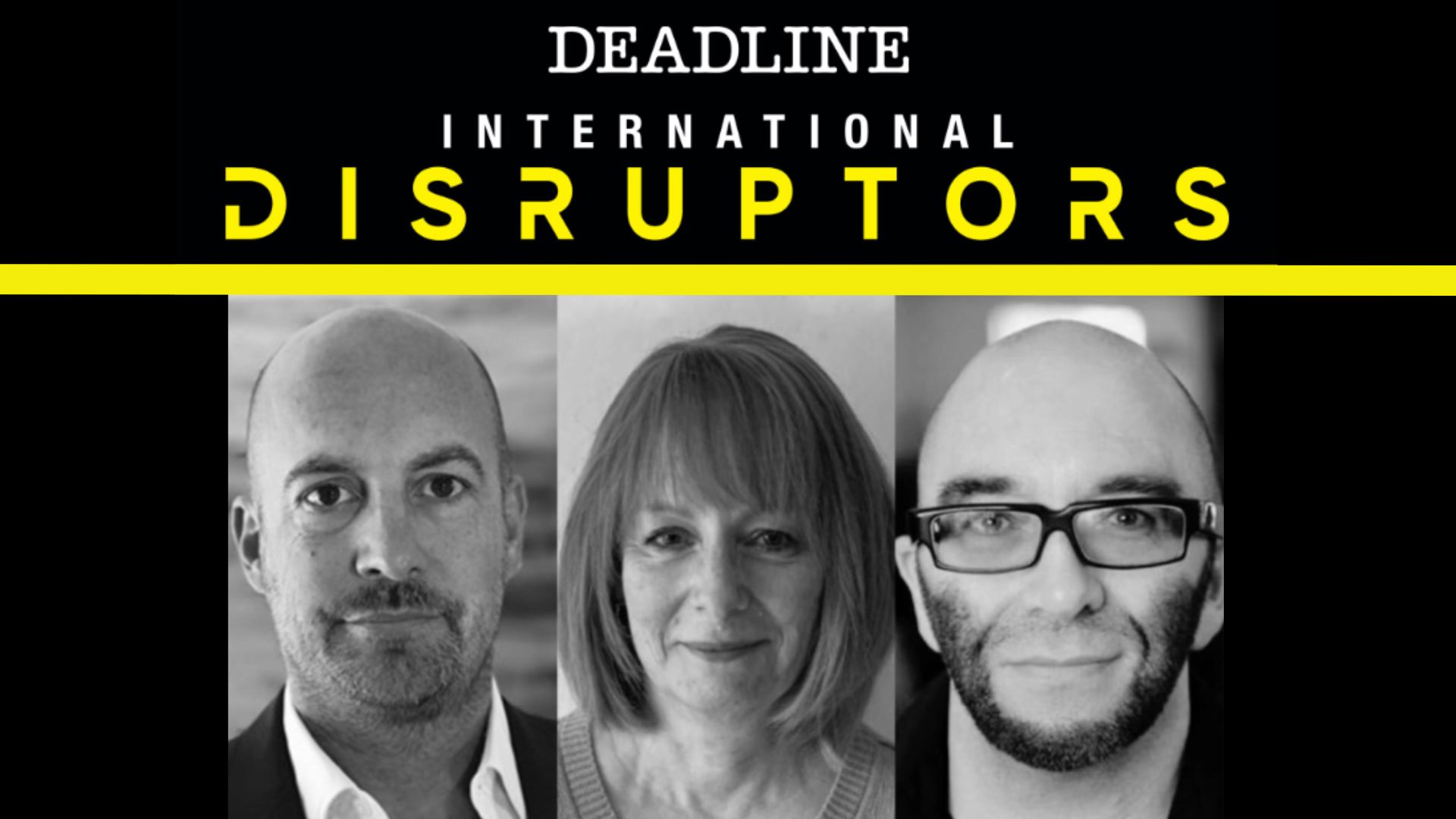Article originally appeared in Deadline By Diana Lodderhose
Welcome to Deadline’s International Disruptors, a feature where we shine a spotlight on key executives and companies outside of the U.S. shaking up the offshore marketplace. This week, we’re talking to UK indie veteran Vertigo Films, producer of hit TV shows Britannia, Bulletproof and James Corden and Sally Hawkins starrer Mammals and feature films Monsters, Bronson and Streetdance 3D. Last year, Federation Entertainment acquired a majority stake in the company and we talk about that deal, Vertigo’s pivot from UK indie film to television and why they’re turning their heads back to the indie film space again.
James Richardson and Allan Niblo remember the exact moment they decided to make the jump from the indie film space into the television sphere. It was at the 2014 American Film Market – one of their busiest markets – when the Vertigo Films co-founders walked into the Loews in Santa Monica and immediately felt that something had changed.
“It was a weird feeling,” recalls Richardson. “But there was a definite sense in the air that something was shifting in the film business so we decided to cancel our meetings and head to Joshua Tree and work out what we were going to do.”
After an eight-hour walk in the desert, the duo and their CEO Jane Moore decided to “stop making movies for a while” and turn their efforts to the television sector.
It would be a bold step for Vertigo, which had spent more than a decade successfully producing and distributing lower-budget films in the UK, ranging from its first cult project to The Football Factory (written and directed by Vertigo partner Nick Love) to its European dance phenomenon Streetdance 3D, which was the first 3D film to release out of the U.S. in 2010 and spawned a sequel and a French remake. That same year it produced Gareth Edwards’ feature debut Monsters off of a $500,000 budget, setting the benchmark on low-budget visual effects.
The company had forged a solid place in the British independent film space and created a reputation for taking punts on new talent – such as Edwards or Nicolas Winding Refn’s first English-language project Bronson with a young Tom Hardy – and crafting hits with sensible budgets. “When we first set up Vertigo, we said we absolutely cannot be making films in the £10 to £12 [$12.6 to 15] million mark – they had to be made for £4 to £5 [$5 to 6] million,” says Richardson.
The company had also established international sales outfit Protagonist Pictures, which it set up with Film4 and Ingenious (it is still a minority shareholder) as well as boutique VFX studio Automatik VFX.
Their Joshua Tree visit, however, was prefaced by the company’s growing frustration with what it meant to be a “successful” British indie producer and distributor. The UK was – and still is today – facing a rapid decline in independent film financing while theatrical rental fees are among the toughest in the world, with cinemas taking 70 to 80% of the box office.
“It was hard because we were making these massive hits like Streetdance and we weren’t making massive amounts of money out of it, so we really had to question things,” says Richardson. “So, we all agreed that the right thing to do was to actually divest ourselves from the film stuff while we concentrated more on TV.”
When they returned from that trip in the desert to Santa Monica, Richardson recalls dining in the same restaurant as a group of acquisitions execs (including former M6 Group film producer Lionel Uzan) who were “celebrating the fact that they had just beaten Netflix to the first window of [Quentin] Tarantino’s The Hateful Eight.”
“That celebration made us realize we were doing the right thing – if the big celebration was against the ‘new’ people like Netflix, we knew we were onto something,” says Richardson. “We told Lionel then that we were going to move into TV and he said, ‘Well, that’s a smart move – I think I’m going to do the same.’”
Shortly after, Uzan joined Pascal Breton’s then burgeoning Federation Entertainment Group (now Federation Studios) while Vertigo went on to make hit shows like Bulletproof and historical fiction drama Britannia for Sky (Amazon carried the first season in the U.S., while Epix took Seasons 2 and 3) as well as recent Spanish crime drama A Town Called Malice and James Corden and Sally Hawkins starrer Mammals for Amazon Prime Video.
The execs admit that Vertigo product, which had earned a reputation throughout the years for targeting the younger male audience with films like London cop actioner The Sweeney or Danny Dyer fronted gangster pic The Business, was a tough launch to broadcasters when they started out.
“When we first started talking about projects with broadcasters, they didn’t want to do them because they were too provocative and it wasn’t the right content for what broadcasters were making,” says Niblo. “The synergy didn’t really come until streamers came along and recognized big, bold and ambitious fare like Britannia. When Amazon went for that, it was a real signal that the market and appetite for what TV broadcasters would want was changing.”

Since then, Sky canceled the popular London East End crime series Bulletproof in its fourth season after sexual misconduct allegations were made against star Noel Clarke (which he still denies) while Jez Butterworth’s Britannia was canceled after Season 3’s cliffhanger finale earlier this year. Last month, Sky also pulled the plug drama A Town Called Malice, which came as a surprise to many given preparations for Season 2 were underway.
But it’s not something the team are too perturbed about – it’s part of the game. “A Town Called Malice is a show that we’re incredibly proud of,” says Moore. “It’s been exuberating to help bring Nick Love’s unfiltered, raucous 80s thriller vision to life once again. We’ve loved working with such a talented and fearless cast and crew and couldn’t be happier with what we all made together.”
Pan-European family
Last year, that AFM evening came full circle when Federation acquired a majority stake in Vertigo, marking its first British acquisition for the pan-European studio after having built up a collective of production talents in France, Italy and Spain. Uzan had previously done French remakes of both The Sweeney and Streetdance 3D, so the group already had a familiarity with the French exec and his way of working.
“There was an immediate spirit alignment,” says Richardson of the deal. “Jane and Allan and I just kind of straight away said, ‘Look if we’re going to do this, let’s do it with the right spirit. Let’s do it with a bunch of slightly crazy but incredibly experienced and ambitious people who want to become a European studio.”
Moore adds, “There was a lot of synergy for us. We came from having shareholders – other than us three – who weren’t really in the business and weren’t particularly interested in the company to having Federation who have that big sales and distribution infrastructure, which is incredibly beneficial to us now, not only for getting market intel but for helping us with our shows. The fact that they have so many different companies around the group gives us more opportunities.”
Richardson says there are a few projects they are starting to line up under the Federation banner. “It’s only really starting,” he says. “It’s been very eye opening because I think that one of the things we recognize after our last few years of learning about the TV business is that those European relationships are going to be evermore important as the UK gets more closed off. Also, Europeans can make shows for fifty percent or sometimes a third of the budget that we are making them for in the UK. It’s a system that we really should adopt.”
One of the things Vertigo can bring to the table, is their knowledge of structuring independent film financing, something they want to adapt to TV financing, which has typically been very rigid.
“It needs to be more flexible and we’re going to do things how we did before, which is finance things independently because that’s how we’ve always done it and we’ve learned the system so well,” says Niblo.
Richardson adds, “Broadcasters are going to need to spend less as budgets are too high at the moment so going down the indie film financing route seems a likely path.”

Balancing act
Last year, after a focus on television for eight years, the company stepped back into the film space with romantic comedy This Is Christmas starring Kaya Scodelario and Timothy Spall for Sky Cinema, and have since stepped back into film production.
“It was so nice to be doing a film again and have just one script across an eight-week shoot,” says Niblo, admitting the experience has been a catalyst for the company to diversify its output of content and step back into the film arena.
In just four months, the group developed 12 projects and, while they didn’t go to Cannes last year, they’ll be returning to the Croisette in full force next week.
“They range in budgets and they range in genre,” says Richardson. “I think we’ll always be genre-led and I think all of our projects are in some way or form genre-led – that includes rom-coms as well as thrillers and action and horror.”
The company is teaming with Nathan Byron and Tom Melia, the writers behind Sundance premiere Rye Lane, for romantic comedy feature The Whole Hog about a newly broken up couple who are forced to temporarily reconcile their differences and travel the food festivals and markets of Britain together as they try and make a success of the food truck that they sunk their savings into before they split up.
It’s also lining up a new horror TV series dubbed The Last Days of Jack Sparks, based on Jason Arnopp’s genre-bending novel of the same name. That project will reunite Vertigo with Britannia director Rob Savage.
“Being able to go to market with both TV and film has been really interesting and exciting,” says Moore. “It gives us that flexibility that you need in the current climate right now.”
As ever, they’ll work with different partners but their connection to Protagonist and Federation’s joint venture with Patrick Wachsberger’s Picture Perfect Entertainment they see as possible routes to market.
“It’s a new world out there,” says Richardson about returning to film. “It’s a very different place than it was eight years ago and so actually being part of a TV sales business is exactly the right place to be in, in our mind.”
Adds Niblo, “It’s an exciting time to be getting back into film again for the same reasons it was exciting to get into TV – there are all of these opportunities that are now there for a company like us to support the kind of talent that isn’t being supported and make the types of films that aren’t being made and just get on with it.”



